
Tim Farron is getting emotional. Tears well up in the eyes of the Liberal Democrat MP and his voice cracks as he recounts the words of a constituent to his daughter. “The lady said to Gracie: ‘You should be really proud of your dad. We were stuck in a bedsit and he rehoused us. You should be really proud of your daddy.’”
He goes on: “If she’d told me that, I’d have said: ‘That’s very kind of you to say, but you got rehoused because hundreds of volunteers delivered shedloads of leaflets and the Liberal Democrats won elections. We built council houses and that’s how we rehoused you. So you should be dead proud of yourself. I’m proud of you.
“‘It’s because we won elections we rehoused [your] family and a thousand more besides. That is what winning means. Winning is not about holding office, winning is about making a difference – and I need you to win again.’”
It is this heart-on-sleeve style that has made Farron the darling of Lib Dem activists and a possible future party leader. He has an indispensable gift for making members feel that they are part of a moral crusade, a cause that justifies the unglamorous business of door-knocking and leaflet-delivering. He recently stood down as the party’s elected president after serving the two terms to which he was constitutionally limited. Yet some said that he could have held the job for life.
“Winning here!” boasts the familiar Lib Dem slogan on the wall behind him. Farron, at the age of 44, is part of an elite group of yellow-rosetted MPs for whom that remains true. As he reminds activists gathered at the Shakespeare Centre in Kendal for the launch of his re-election campaign, he won the constituency of Westmorland and Lonsdale by just 267 votes in 2005. “Who would have given us a chance of ending what was by that time 95 years of Tory rule? I don’t know.”
Yet with Stakhanovite graft, Farron converted that micro-majority into one of 12,264 in 2010. There is a clue to his success: his office has done 70,000 pieces of casework, ten times that of the average MP.
On the night of the launch, Farron was preceded by Shirley Williams, the party’s social-democratic doyenne and a doughty campaigner at 84, who unhesitatingly praised him as one of the Lib Dems’ “best-ever” parliamentarians.
No reference was made to his status as leader-in-waiting. There is surprisingly little local awareness of Farron’s potential ascent, though some constituents “worry about him going off to become deputy prime minister”.
Farron is neither politically nor personally close to Nick Clegg. Indeed, perhaps no two senior Lib Dem figures are less alike. One is left-leaning, northern (Farron grew up in Preston), state-educated, Christian and folksy; the other is right-leaning, southern, privately educated, atheist and technocratic. It is not surprising that Farron was chosen to play Nigel Farage during Clegg’s preparation for his debates with the Ukip leader: the pair are natural antagonists.
To internal critics, Farron exemplifies the student union politics from which the Deputy Prime Minister has tried to dissociate the Lib Dems. A Farron leadership, one source told me, would be “a regression to the Charles Kennedy era”. As a non-member of the coalition government (though he now serves as his party’s foreign affairs spokesman), Farron has been free to rebel without fear of endangering his position. He voted against tuition fees, the NHS bill, secret courts and the bedroom tax. After this last vote, a senior party figure was moved to ask: “Which bit of the sanctimonious, God-bothering, treacherous little shit is there not to like?”
When I ask Farron whether he will stand for the leadership next time there is a vacancy, he replies with the carefully worded answer of a man who has faced the same inquiry many times. “My answer to that, and I know why you ask it, is that this is – and you know there’s no kind of hyperbole here – the toughest election we’ve faced, certainly for a generation, possibly for longer. In which case me giving headspace or column space to any ambition I may or may not have [and] what will happen after 8 May wouldn’t just be energy-sapping, it would be diverting. It would be arrogant. I’d be a bit of a prat if I spent much or any time thinking about it.”
Farron may soon have no choice. Among most Lib Dems the “working assumption” is that Clegg will depart after the election unless he can form another stable coalition with the Conservatives. At one point in our conversation, Farron reflects on the irony that first-past-the-post, the electoral system against which the Lib Dems have long crusaded, could now be their saviour. Renowned incumbents will survive; other candidates will be swept away.
“A major job for us after the election is to begin rebuilding; you have to protect the citadels first. Then we can go out and repopulate the plains.”






